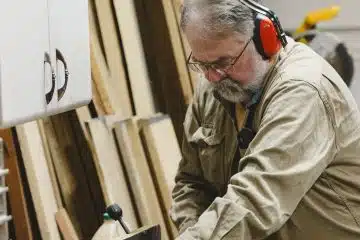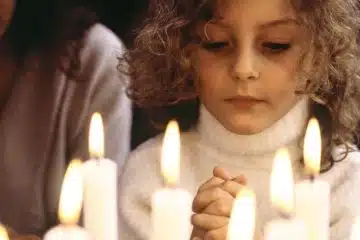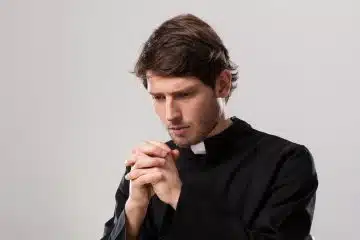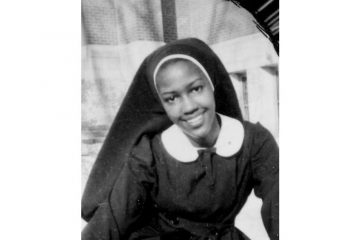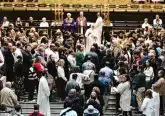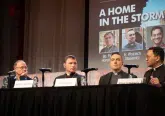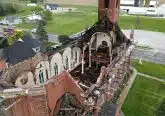Doctor studies to heal souls
September 26, 2011
By Melanie Crowe
ST. LAWRENCE DEANERY — As the old saying goes, “If you want to get something done, ask a busy person.”
 |
| Dr. Marc Alexander poses in front of the Good Samaritan Free Health Clinic of Price Hill. (CT/Colleen Kelley) |
This definitely holds true for Dr. Marc Alexander, now in the second year of study in the deacon formation program at the Athenaeum of Ohio. In April, Chief Operating Officer of Good Samaritan Hospital David Dornheggen asked Alexander to serve as the physician champion at the Good Samaritan Free Health Center of Price Hill. In this role, his task is to recruit other physicians to volunteer their time and expertise, serving health center patients in one of Cincinnati’s poorest neighborhoods.
An internist with a busy office on Glenway Avenue, Alexander has been practicing medicine for 28 years. He also serves as the medical doctor to the Little Sisters of the Poor as part of his preparation to be ordained a deacon. “When they dropped it in my lap, I figured, let’s go!
There’s no grass growing under my feet,” he said.
Alexander said that his greatest personal challenge is time. “Saturday is volunteer day,” he explained. “I work at St. Vincent DePaul on Saturday morning and at the clinic on Saturday afternoon.”
His busy schedule hasn’t stopped him from delivering on his commitment to the health center. So far, Alexander has recruited 31 doctors, which allows the clinic to hold office hours two days a week. Visits are typically by appointment, with most patients referred by the nearby Santa Maria Community Services, which provides greater Price Hill with tools and educational resources to build strong families, promote healthy residents and foster neighborhood revitalization.
For Alexander, deciding to become a deacon was a response to the call of the Holy Spirit. “Five years ago I had a mini middle-age crisis, [realizing that] I probably don’t want to practice medicine for the rest of my life,” he said.
That’s when he began to consider pursuing the deaconate, ultimately deciding to work on spiritual healing as a complement to his vocation in physical healing.
“The Holy Spirit has given me a great ride,” said Alexander.
Of his volunteer experience, Alexander said that it’s been fulfilling. He finds his reward in thankful patients. “I saw a kid in my office on Wednesday, and on Saturday, I saw his uncle [at the health center]. We are capturing people who are down on their luck and really need health care.”
The health center serves Price Hill residents who don’t qualify for public assistance, but still have financial or other barriers to accessing health care services, he noted.
Free from pride, Alexander is quick to show his gratitude. “This is not about me, it’s about the gifts God has given me. I’m called to do it.”
He didn’t have far to go to respond to the call. He grew up three miles from the health center, and Elder High School, his alma mater, is just one mile away. Now a parishioner at Our Lady of Visitation Parish, he drives five miles from home to volunteer his services on Saturdays at the health center.
“Everybody is happy with the numbers,” said Alexander. From January to the end of July, the health center has had 547 visits.
“I’m pleased to have the opportunity to help somebody,” he added. “I approach this with a humble heart; I am extremely blessed. This is my way to give back for all that I have.”
He said that the greatest challenge for the health center is expanding to meet the needs of the community, citing the growing Burundi and Hispanic population and resulting language barriers. “They don’t have private insurance, so they’re falling through the cracks and we can meet that need.”
In addition to volunteer medical staff, Alexander acknowledged the need for volunteer interpreters.
The health center, which shares space within Santa Maria Community Services, provides adult primary medical care (no obstetrics) for people who have been pre-qualified and fall within poverty guidelines. The health center currently sets appointments on Wednesdays from 2-8 p.m., and Saturdays from 8 a.m.-2 p.m.
“The health center was sparked by the idea to bring medical mission work closer to home,” said Lori Uphaus, executive director. “Our primary motivation for taking the lead on the project is to improve the overall health of the community,” she said.
According to Alexander, 40 percent of Good Samaritan Hospital patients come from the west side. Current resources in Price Hill provide health screenings but, as Uphaus points out, “The screenings identify more problems than existing medical facilities in Price Hill can handle.
Many uninsured people are either not receiving care, or they are over-utilizing hospital emergency departments for care that could be avoided with regular primary care visits and preventive health support.”
Patients are pre-screened by center staff as well as by Santa Maria nurses and TriHealth parish nurses, which leads to another unique aspect of the center: the engagement of social workers and health care workers who are already directly involved with the underserved community.
Because patient referrals come from existing community programs such as Santa Maria and TriHealth parish nurses, the center is able to better reach those who need the care most. The center also continues to work on leveraging additional collaborative opportunities that will further spread its mission and services to those who need it most. One example is the Society of St. Vincent de Paul of Cincinnati, which serves a similar population of patients and aligns with the center’s mission.
A community needs assessment conducted by Crossroad Health Center and funded by the Health Foundation of Greater Cincinnati identified more than 12,000 uninsured people living in the Price Hill area who have difficulty accessing regular health care. They often wait three to six months for an appointment at a health clinic or go to a hospital emergency department to receive episodic care. This diverse community includes a large number of working poor who earn too much to qualify for programs such as Medicaid, but too little to afford health insurance.
“We’re planning on doing this for the long haul,” Alexander said, noting that the the health center has secured funding for three years, beginning with support from the Good Samaritan Foundation. The health center is also being funded through donations from the Castellini Foundation, SC Ministry Foundation, the Health Foundation of Greater Cincinnati, US Bank Trustee for the Maxwell C. Weaver Foundation and James and Darla Wainscott.
Volunteer support is a key component of the center. The model calls for volunteer support from physicians, nurses and social workers. A total of 31 physicians have already signed-up to volunteer their time. For more information about volunteering, please call 513-557-2700, ext. 203.




